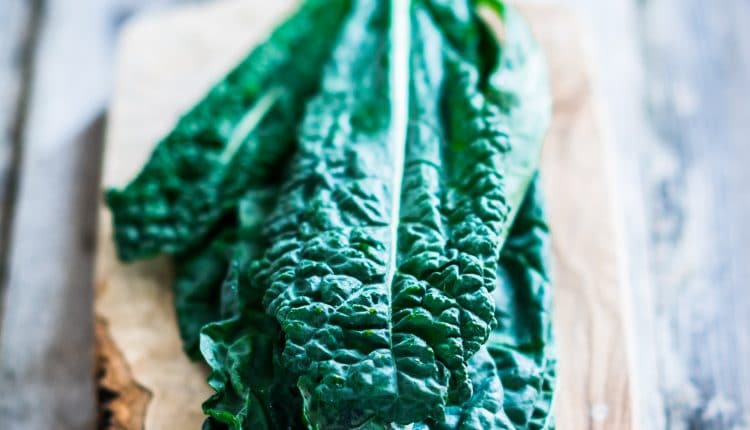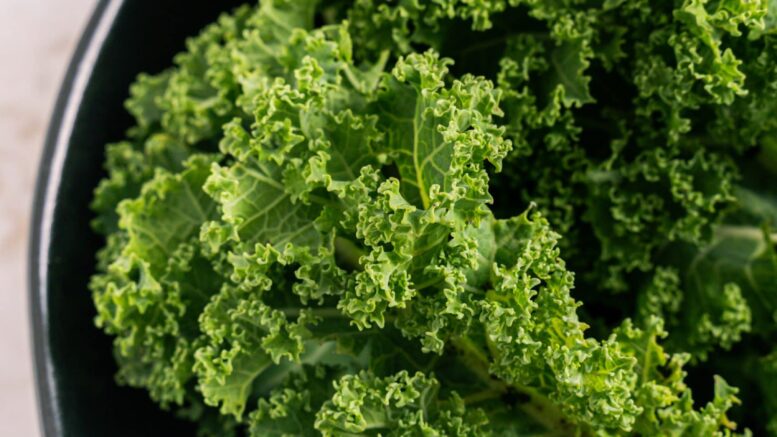Is Kale Good for Diabetes? Overview
The popularity of kale has increased in recent years. More and more people are using it as an ingredient for healthy salads and smoothies.
You can even make chips out of it. But is it a good idea to include this vegetable in a diabetes-friendly diet? How does kale affect blood glucose levels? What health benefits does it offer? Let’s find out.
Kale is a member of cruciferous vegetables, like cabbage, cauliflower, broccoli, collard greens, and Brussels sprouts.
It comes in various forms: dino kale, red Russian kale, curly kale, etc. The major differences between these are the color and shape of the leaves.
Curly kale (or Scots kale) is the most common type and has curly, green leaves and hard stems.
Nutritional Value of Kale

Is Kale Good for Diabetes – Nutritional Value
Kale shares many similarities with other leafy green veggies and is one of the most nutrient-dense foods you can eat. According to USDA 100 grams of kale contain:
- 90 grams of water – due to high water and low carb content, the caloric value of 100g of kale is just 43.
- 4.5 grams of carbs – almost all of them are dietary fiber, which is proven to positively affect blood glucose levels, by inhibiting the absorption of carbs from other food sources.
- 3 grams of protein – Kale contains all essential and nonessential amino acids.
- 1.5 grams of lipid
- Vitamins and Minerals – Vitamin A, Vitamin C, Vitamin K, Vitamin B6, Calcium, Manganese, Magnesium, Copper, Potassium and more.
Health benefits of kale
The American Diabetes Association mentions kale in their list of “superstar foods for diabetes”. Here are some positive effects kale has on our health.
Improved glycemic control
As mentioned above, kale is an excellent source of fiber. One cup of kale contains about 10% of our daily need for fiber. Increased intake can help reduce blood glucose levels and positively affects HbA1c results, which is the main indicator for determining how well a patient is controlling diabetes.
A small study was conducted in 2016. 42 Japanese individuals between 21 -64 years participated. The goal was to reveal the hypoglycemic effects of kale. Participants were randomly allocated to the three groups. Each group was given a placebo, a high dose of kale, or a low dose of kale along with a high-carbohydrate meal.
The postprandial plasma glucose levels in subjects who consumed kale were “significantly lower than those in subjects with the intake of placebo”.
Less oxidative stress
Kale, like other green vegetables, does a great job fighting free radicals. Some of us may not acknowledge the negative effects of these substances. Free radicals are atoms that directly damage our cells and cause our bodies to degenerate.
This leads to quicker aging and leaves us vulnerable to various diseases. Oxidative stress is believed to be one of the cofactors for developing diabetes as well.
So how does kale tie into this? It is high in antioxidants. Antioxidants help to reduce the effect of oxidative damage from free radicals.
Apart from that, antioxidants found in kale have other positive effects. In animal studies, Quercetin and Kaempferol have shown anti-inflammatory, heart-protective and blood pressure lowering effects.
Can help to lose weight
For many people who suffer from diabetes, especially type 2 diabetics, controlling body weight is an essential part of effective treatment.
Kale has all the properties of weight loss-friendly food: it is mostly composed of water, has a very low energy density, and contains a decent amount of proteins. Kale also has a high fiber content, thus helping you feel full for a long time.
A powerful source of vitamin C
Kale even beats oranges in terms of vitamin C content and accommodates a daily dose of vitamin C in only 1 cup. This vitamin is necessary for various processes in our body.
Can lower cholesterol
Kale contains bile acid sequestrants, which bind to bile acids in our intestines and prevent them from being reabsorbed, thus lowering the total cholesterol amount in the body.
This might reduce the risk of heart disease over time, studies suggest. We can even find evidence that kale juice increases the amount of HDL (“good cholesterol”) and decreases LDL (“bad cholesterol”).
In addition, kale has a better balance of omega- 3 and omega-6 fatty acids than most other veggies which further contributes to heart health.
All these factors are of great significance for diabetics, who are already at higher risk of cardiovascular diseases.
Protects eyes
Lutein and zeaxanthin, found in large quantities in kale, are powerful antioxidants that reduce the risk of age-related macular degeneration.
Several studies have shown that enough lutein and zeaxanthin in diet can lower the risk of common eye disorders: macular degeneration and cataracts. Spinach offers similar benefits
Possible drawbacks
- Can deplete iodine – this is true for people who already have hypothyroidism – hypofunction of the thyroid gland.
- Too much fiber can cause constipation and bloat – in this case simply reduce intake and switch to other vegetables.
- Warfarin therapy – If you are taking a blood thinner (anticoagulant) drugs, such as warfarin, you should avoid or limit the number of green vegetables like kale, spinach, and broccoli.
Take-home points
The number of studies demonstrating kale’s hypoglycemic effects is limited. But the positive effects of precious nutrients found in kale and other leafy green veggies have been studied for a long time.
So there is no doubt that kale is a perfectly safe and suitable addition to a diabetes-friendly diet.
References:
https://www.ncbi.nlm.nih.gov/pmc/articles/PMC5103670/
https://www.diabetes.org/healthy-living/
https://pubmed.ncbi.nlm.nih.gov/24470791/
https://pubmed.ncbi.nlm.nih.gov/16723441/
https://www.mayoclinic.org/diseases-conditions/
See Also

As a nutritionist, I research, find and experiment with recipes, natural diets and meal plans for weight loss, bodybuilding, and detoxing.
